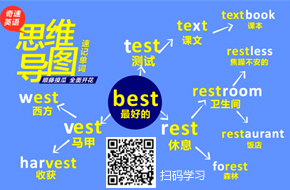四会单词:(备注:会听、会说、会读、会默写的全面掌握。)
1.Who’s your art teacher?你们的美术老师是谁?
----Yes,she is/No, she isn’t.
I have a new math teacher.
我有一个新数学老师.(小学三年级已经学过I have a pen.)
play computer games 玩电脑游戏
1.What day is it today?今天星期几?
2. What do we have on Mondays?
—We have English,science,computer and P.E.
3.What do you do on Saturdays?
星期六你干什么?(具体的某一天前用介词on,在具体的时间前,用介词at)
—I often do my homework.我通常做家庭作业.
—I do my homework,too.我也是做家庭作业.
1.What would you like for lunch?
-----I'd like some tomatoes and mutton.
2.What's your favourite fruit?
------/I like apples.我喜欢苹果.
3.I don't like grapes.我不喜欢葡萄.
4.Bananas are my favourite.我最喜欢香蕉.
1. I'm helpful! I can sweep the floor。
2. Are you helpful at home?
3. What can you do ? 你会干什么?
------I can sweep the floor.我会扫地。
4. Can you do housework? 你能会家务吗?
------Yes I can.是的,我会 No, I can't,(but I’d like to have a try.)不,我不会,但我想试一试.(括号内的句子可以省略)
1、当你想询问别人会干什么时,用What can you do? 答句I can后面加自己会做的事.
当你想知道他人会干什么时,可用What can he do ? 或者What can she do ? 答语是He can......或者是She can......
2、I can …变为一般疑问句:Can you …?
He can…或She can …变为一般疑问句:Can he …/ Can she …? 其中的he , she 也可以变为其他具体的人物。
如 My mother can cook the meals. 变为一般疑问句:Can your mother cook the meals? 答语有两种:肯定回答Yes,she can.否定回答:No,she can’t.
3、help (形容词形式)---helpful helpful (动词形式)---help
4、当句子中出现了情态动词can或其否定形式can’t时,其他的动词要用原形。
1.Is this your bedroom? 这是你的卧室吗?
2.I have my own room now.现在我有自己的房间了。
------There is a mirror, a bed and a big closet.
(There be句型,某地有某物:There is / are + 家具 )
4.Where is the trash bin? 垃圾箱在哪?
------It's near the table. 它在桌子旁边.
5. The closet is near the table.衣橱在桌子旁边。
6. Many clothes are in the closet. 许多衣服在衣橱里。
1、There be 句型包括单数形式的There is a/an …句型和复数形式的there are …句型。There is a/an …句型表示有一个,后面跟名词单数。There are …句型表示有多个,后面一般接具体数字或some , many,再后面跟名词复数。
There be 句型又叫“存在”句型,它一般表示在某地有某物。
2、There be 句型中使用单数句式还是复数句式遵循就近原则。
over在…上面,表示与下面的物体不接触,两个物体之间有一定的距离。
1.There is a forest in the nature park.在自然公园里有一个森林。
2. Is there a forest in the park? 公园里面有一个森林吗?
------ Yes, there is. 是的,有。No, there isn’t。不,没有。
(There be句型的一般疑问句:--- Is / Are there + 某物 + 某地?回答:Yes, there is / are. No, there isn't / aren't. )
3. There are many small houses in my village. 在我的村庄里有许多小房子。
5.Are there any pandas in the mountains? 山里有熊猫吗?
-----Yes, there are.是的,有/No,there aren’t. 不,没有。
1、There be 的单数形式在变为一般疑问句时,将助动词be提前,与there交换位置,如句中有第一人称代词,变为第二人称,将句末的句号变为问号,其他不变。
There be 的复数形式在变为一般疑问句时,将助动词be提前,与there交换位置,然后将句中some或many变为any, 如句中有第一人称代词,变为第二人称,再将句末的句号变为问号,其他不变。
2、There be 句型表示“有”和have, has表示“有”的区别
There be句型表示“有”的意思,表示在某个地方有什么,它表示的一种存在。
如:There is a bag on the desk. 有一个书包在课桌上。
There are many books on the desk. 有许多书在课桌上。
Have, has 表示“有”的意思,表示一种占有,拥有的关系,一般表示某人有某物。当主语人称是第三人称单数时用has, 其他时候用have。如:I have a new pen. 我有一支新钢笔。
He has a big schoolbag. 他有一个大书包。

人教版 六年级上册
1. Where is the …? It’s next to/ in front of/behind/near/beside/on the left of/on the right of the …. (询问地点和方位;记住这些方位词)
2.How can I/we get there? Turn right at the school. Then go straight.
How can I/we get to the science museum? It’s over there. You can go by/take the No.15 bus.
(问路,可以有很多灵活的回答,告知怎么走或告知交通方式,前面最好加上Excuse me。)
3. 记住以下12个疑问词:what(什么) where(哪里) who(谁) which(哪一个) how(怎么样) when(什么时候) what time(什么时间) how many(多少数量) how much(多少钱) why(为什么) whose(谁的) how old(多大)
4. buy a postcard(买一张明信片) send a postcard(寄一张明信片)
6.A talking robot(一个说话的机器人)
7. What a great museum! (感叹句,多么伟大/棒的一个博物馆啊!)
8. There is a pet hospital in my city.
There are some bookstores in my city.
Is there a pet hospital in your city?
Are there any bookstores in my city?
(there be句型的单复数、肯定句和一般疑问句形式回忆起来)
9. What an interesting film!
10. Italian restaurant (意大利餐厅)
12. On Dongfang Street (注意介词)
13. work 有多种意思,比如工作;奏效,起作用,需根据上下文来理解。
1. How do you go to school?
(去,代表当事人不在学校)
How do you come to school?
(来,说明当事人在学校)
(区分go和come的区别,复习课本P20)
always(总是,一直) usually(通常,大多数时候)
often(经常,常常) sometimes(有时候) never(从不)
3. You must pay attention to the traffic lights. (注意)
4.early(早)和late(迟)是一对反义词。
6. How do you get to the USA from China?
7. one可以表示数量一,也可以作代词,指代前面提到的事或物,应根据上下文来理解。
8.Go at a green light. (肯定)
Don’t go at the red light. (否定)
10. Slow down and stop at a yellow light. Stop and wait at a red light. Go at a green light.
(记住三条交通规则;介词用at)
11. a lot of=lots of (许多)和a little(一点)为反义词。
12. fast(快的)和slow(慢的)是反义词。
13. by sled(坐雪橇) by ferry(坐轮渡)
1.一般将来时 (be going to / will + 动词原形)
表示一般将来时的时间状语有:this morning, this afternoon, this evening, tomorrow, tonight, this weekend, on the weekend, next week, next month, next year, next Sunday, next Saturday
(今晚)你将要做什么?
What are you going to do ( this evening)?
I’m going to the cinema.
I’m going to visit my grandparents.
你将什么时候去?
I’m going at 7:10. (没有to)
你将怎样去呢?
I’m going by bus. (没有to)
今天下午你将要去哪里?
Where are you going this afternoon?
I’m going to the bookstore.
你将要买什么呢?
What are you going to buy?
I’m going to buy a comic book.
2.I’m going to look for some beautiful leaves.
3.What are you/we/they going to do?
We/You/They are going to … /I am going to…
What am I going to do? You are going to …
What is he/she/it going to do?
He/She/It is going to …
(注意不同人称与be动词的搭配)
4.have an art lesson(上一节美术课)
Have a good time!(祝你玩得开心!)
6. Why not go in Tuesday?
(为什么不在周二去呢?Why not后面跟动词原形)
7.It’s half price then. (半价)
8.We are going to see a film about space travel!(关于)(太空旅行)
9.Can I help you? 用于商店里购物前营业员所说
10.read a poem have a big dinner make mooncakes tell us a story about Chang’e
(注意动宾搭配)
1. 进行时态 (3种变化规律)
1) 直接+ing:do—doing draw—drawing sing—singing play—playing read—reading
2) 双写末尾字母+ing:swim--swimming run—running sit—sitting
3) 去末尾的e+ing:write--writing dance--dancing take—taking make—making
你正在干什么?我正在画漫画。What are you doing? I’m drawing cartoons.
他/她/它正在干什么?What is he/she/it doing? He’s/She’s/It’s …
你们/他们/她们/它们正在干什么?What are you/they doing? We/They are …
表示爱好的动词要加ing,即看到like或likes或hobby或hobbies后面的动词要加上ing。
2. 第三人称单数转变的规律:
1) 一般情况动词末尾加s。
2) 动词以o,ch,sh,x等结尾的末尾加es。(如:watches, teaches, goes, does, washes)
3) 动词以y结尾的去y加ies。(如:studies, flies)(play比较特殊,直接加s)
4) 特殊的单词:have—has
He likes drawing pictures.
She works in a car company.
It comes from the clouds.
My father goes to work on foot.
Li Lei often plays computer games after lunch.
3. can后面加动词原形
What can you do?
I can cook the meals.
He can fly kites.
She can play the violin.
4. What is his/her hobby? He/She likes … (单数)
What are his/her hobbies? He/She likes …(复数)
(问爱好,likes后面的动词加ing)
5. Does he live on the South Island?
Yes, he does. (肯定回答) No, he doesn’t. (否定回答)
(注意前面does加了es,后面动词live不需要变化了。)
6. Does he like doing word puzzles and going hiking?
Yes, he does. (肯定回答) No, he doesn’t. (否定回答)
(注意前面does加了es,后面动词like不需要变化了。)
7. He lives on a farm, so sometimes he reads to the cows!(注意介词)
8. That’s interesting. (那是有趣的。) Amazing! (好惊奇啊!)
9. also和too的区别:also放在句子中间,
如:He also likes singing. too放在句子末尾,用逗号隔开,如:He likes singing, too.
10.Jasmine Flower(茉莉花) is a Chinese song.
11.On Sunday at 1 p.m. in the morning/afternoon/evening (注意介词的用法)
1.What does your mother do? She is a/an …(问职业)
2.I’m going to be a head teacher one day. (有一天我将成为一个校长。)
3.Where does he/she work? He/She works in/on/at/ …(问工作地点,注意不同介词的用法)
4. How does he/she go to work? He/She goes to work …(问去工作的交通方式)
5.Do you want to be a head teacher?No, I want to be a businessman.(注意be,成为)
6.Is your father a postman? Yes, he is. No, he isn’t.
7.职业单词的变化:
1) 加er:worker teacher driver farmer singer dancer cleaner writer
police officer player reporter
2)加or::doctor
3) 加man或woman(有性别之分): fisherman fisherwoman businessman businesswoman postman postwoman
4) 加ist:scientist dentist(牙医)pianist(钢琴家)
8.in/at a university at sea near the sea in a gym on a plane
(注意不同介词的用法)
9.We should study hard (努力学习)and stay healthy(保持健康).
(should后面加动词原形)
10.He is good at football.(擅长于)
11.陈述句转变为疑问句:
Mary has a cat. → What does Mary have?
He goes to school by bus. → How does he go to school?
My aunt works in a gym. → Where does your aunt work?
1.If I feel angry, what should I do?
First, take a deep breath. Then you should count to ten. (征求建议)
3.Should I count to ten? Yes, you should. No, you shouldn’t. (一般疑问句)
4.What’s this cartoon about? It’s about a cat.(关于)
5.The cat chases the mice. (追赶)(mice是mouse的复数形式)
6.They’re afraid of him. (注意介词的用法)
7.The cat is angry with them. (注意介词的用法)
9.I am happy. = I feel happy.
He/She/It is sad. = He/She/It feels sad.
They are worried. = They feel worried.
10.What’s wrong? = What’s the matter? (怎么了?发生了什么事?)
11.Don’t be sad.(别伤心) Don’t worry.(别担心)
12.How do you feel? I am / feel …
How does he/she feel? He / She is/feels
(询问你或他、她感觉怎么样)
13.What should I do? You should …(征求建议)
14.He is stuck in the mud. (他被陷在泥里。)
15.They pull Robin out of the mud.(拉出)
16.everyone(每个人) someone(某人) no one(没有人) anyone(任何人)
17.表示心情或感觉的词语:sad(难过的) happy(高兴的) worried(担心的;发愁的)angry(生气的) afraid(害怕) ill(生病的) cold(冷的) warm(暖和的) hot(热的) cool(凉爽的) thirsty(口渴的)hungry(饥饿的) sorry (遗憾的;抱歉的)excited (兴奋的)good(好的) upset(心烦的) surprised(惊奇的) bad(坏的,糟糕的)
更多预复习资源 长按识别二维码
找到该图片板块 同步微课(免费赠送)
↓↓↓
长按识别二维码 即可报名奇速英语国庆营
文章整理于网络 版权归原作者所有
如有侵权请联系删除













